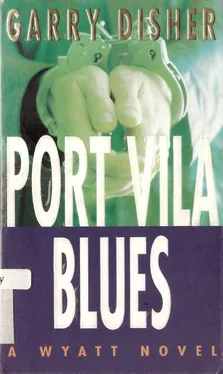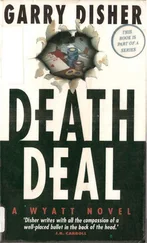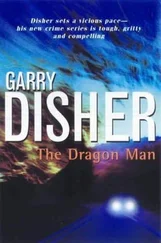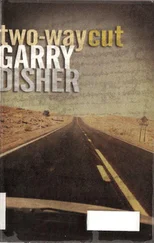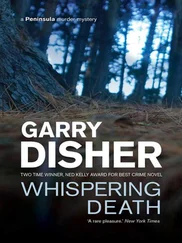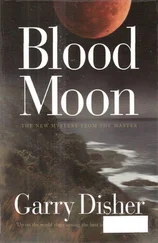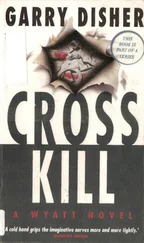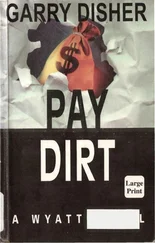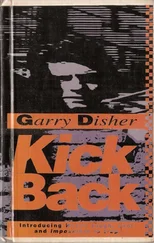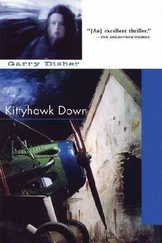Garry Disher - Port Vila Blues
Здесь есть возможность читать онлайн «Garry Disher - Port Vila Blues» весь текст электронной книги совершенно бесплатно (целиком полную версию без сокращений). В некоторых случаях можно слушать аудио, скачать через торрент в формате fb2 и присутствует краткое содержание. Жанр: Криминальный детектив, на английском языке. Описание произведения, (предисловие) а так же отзывы посетителей доступны на портале библиотеки ЛибКат.
- Название:Port Vila Blues
- Автор:
- Жанр:
- Год:неизвестен
- ISBN:нет данных
- Рейтинг книги:4 / 5. Голосов: 1
-
Избранное:Добавить в избранное
- Отзывы:
-
Ваша оценка:
- 80
- 1
- 2
- 3
- 4
- 5
Port Vila Blues: краткое содержание, описание и аннотация
Предлагаем к чтению аннотацию, описание, краткое содержание или предисловие (зависит от того, что написал сам автор книги «Port Vila Blues»). Если вы не нашли необходимую информацию о книге — напишите в комментариях, мы постараемся отыскать её.
Port Vila Blues — читать онлайн бесплатно полную книгу (весь текст) целиком
Ниже представлен текст книги, разбитый по страницам. Система сохранения места последней прочитанной страницы, позволяет с удобством читать онлайн бесплатно книгу «Port Vila Blues», без необходимости каждый раз заново искать на чём Вы остановились. Поставьте закладку, и сможете в любой момент перейти на страницу, на которой закончили чтение.
Интервал:
Закладка:
Springett cruised past, U-turned, parked the bike and waited. He had a fair idea of what the building looked like inside: windows and doors fitted with sensors and alarms; a couple of security guards patrolling the corridors; the guard on the front desk taking a while to get with the flow of the midnight-to-dawn shift, holding a half-full mug of coffee just beneath his chin, yawning in Niekirk’s face, stretching and swallowing a few times as he checked Niekirk into the warren of lockers beyond the security door, camera monitors flickering silently behind him.
A few minutes later, Niekirk emerged without the suitcase. Springett watched him get into the taxi and pull away from the kerb. Bye bye, Niekirk, he thought, and settled back to see who would come for the money.
But Niekirk surprised him. He steered the taxi into the Spencer Street bus terminal, which was just a block away and on the opposite side of the street. Interesting. Maybe Niekirk and the courier were working the skim.
They were muted hours in the city, between 2 a.m. and 6.30. A couple of taxis, slow between the lights, their drivers shoulder-slumped inside, dreaming over the wheel; delivery vans stacked with the midnight print run of the Age; lone cars using Spencer Street as a conduit between west and east of the river. Dew dampened everything and Springett got cold sitting there, watching for the hand that would walk out of the U-Store, carrying a distinctive tartan suitcase.
By 6.30 the station was starting to breathe again. Springett imagined the echoing chambers underground, the shoe snap of early commuters streaming from the trains, walking stunned and staring into the grey light above. He saw them bunch at the pedestrian crossings and choke the Bourke Street trams. A pub opened its doors to the men hawking phlegm into the gutter outside.
A man was stacking newspapers and magazines on the footpath outside the station. Springett saw him stand a box on its side, wrap himself in a blanket, and sit there morosely, scarcely acknowledging the commuters who bought their morning papers and pressed money into his hand, held palm up like a dead creature. But the man did have a styrofoam cup in his other hand and steam was rising from it and Springett felt a hollowness in his gut.
He was curious to see a parking officer rap on the window of Niekirk’s car. She exchanged words with Niekirk, all the while looking toward the rear of the car. An interstate coach was heaving off Spencer Street and into the parking station, road-grimed, snarling, top-heavy with surly, fatigued passengers. Then exhaust smoke from another big motor shot into the air and an airport transit bus rattled into life. The terminal was waking up and Niekirk was getting in the way.
Springett watched Niekirk head the taxi toward the street. He grinned to himself. Niekirk didn’t want to miss connecting with the courier, but at the same time he didn’t want a ticket for parking illegally. A ticket started a paper trail, placing a driver and a vehicle at a particular place at a particular time.
Springett saw him judge a break in the traffic, swing onto Spencer Street and head two blocks away from the station, to an unoccupied parking meter diagonally opposite the U-Store. He reversed in, shunted a few times until the car was angled for a quick exit, and settled back to wait again.
It was 7 a.m. Springett was buffeted as a number of big trucks gusted past him. It was a convoy, cranes, boilers and massive preformed cement slabs and pipes heading for a building site somewhere across the city. They filled the air and Springett might not have seen the tartan suitcase knocking against a blue-uniformed knee if he hadn’t trained himself in twenty years to ignore the things that had nothing to do with the job.
Fortunately the lights changed and the crosstown traffic was stalled long enough for him to watch the progress of the man carrying the tartan suitcase. He was about thirty-five, medium-sized with a forgettable, smooth-cheeked face that might never have been scraped by a razor. The only hair on his head was an inadequate scrape of brown, blending at the edges with pink skin. A pilot or a cabin steward, Springett guessed, judging by the blue peaked cap under the man’s other arm.
That made sense, if the money was going straight to De Lisle in Sydney. It was easy for flight crews to avoid baggage checks, and no one questioned their right to be in an airport or on a plane.
The man walked back along the footpath opposite Niekirk. Springett watched, expecting him to make contact with Niekirk, but he darted across the street and boarded the airport transit bus.
That made sense, too. The courier wouldn’t risk using his own car for this job, and he wouldn’t risk letting a taxi driver log the journey, one fact among the many that map who we are, where we’ve been, that can be used against us one day. The driver of the transit bus, driving this route many times a week, wouldn’t remember the courier.
It all helped to give Springett a better fix on De Lisle, a man who ensured that everyone who worked for him took pains and covered himself and muddied any trail that might lead back to the top. Which probably explained why Niekirk had stopped behind to see who was coming for the money. Working on a need-to-know basis didn’t suit Springett, either. Knowledge was power.
But now Springett knew that he was no closer to knowing who might have pocketed the Tiffany brooch after the Brighton bank job in February. Time for a bit of push and shove. Niekirk was staying at a motel in St Kilda. He’ll keep, Springett thought. First I need to know from Lillecrapp if Riggs and Mansell pulled anything after they left Niekirk in the car yard.
Six
After leaving Niekirk and the money, Riggs and Mansell had driven north, Mansell winding the Range Rover through farming land beyond the hills of the Yarra Valley, Riggs hunting through the FM bands on the radio, filling the vehicle with gulps of sound. Where 3UY should have been there was nothing, only a faint scratching. He switched off and settled back in his seat. ‘Done the locals a favour tonight, no more golden oldies.’
Mansell slowed for a hairpin bend. ‘What’d you do to him?’
‘Clobbered him, tied him to his chair.’
Mansell shook his head. ‘Jesus, Riggsy.’
‘What?’
‘It looks bad. It’s the sort of thing that gets the local boys bent out of shape.’
Riggs could feel anger rising in him. ‘You weren’t there, pal. He was going for the microphone.’
‘What if you’d killed him?’
‘That crap he was playing,’ Riggs replied, ‘I should’ve finished the job.’
Despite himself, Mansell sniggered. He said what Niekirk was always telling them, mimicking Niekirk’s flat tones: ‘Quick, clean, that’s our trademark. We appear out of nowhere, pull the job, disappear without a trace.’
Riggs laughed harshly. ‘Niekirk, writing headlines in his head.’
Mansell said soberly, ‘If he falls, we fall with him, and for blokes like us that’s a bloody long drop.’
Riggs snaked his hand out, clamping his fingers around Mansell’s lower jaw. ‘But it’s not going to happen, is it, old son? Eh? It’s not going to happen.’
He stared at the side of Mansell’s head. After a while he released him. Mansell jerked away, hunching his shoulders. For the next hour, neither man spoke. Riggs gazed sourly out at the blackness beyond the shapes at the road’s edge and Mansell concentrated on throwing the Range Rover through the switchback curves of the road.
They had far to go. The airport was closed for the night and they knew that morning flights, and bus and train departures, could be monitored. The best option they had was to drive-not all the way back to Sydney but as far as Benalla. Here they would dump the Range Rover, change into casual clothes and catch a coach to Sydney. ‘No jobs on our own turf,’ as Niekirk put it. Mansell could see the sense in that. Three times now they’d slipped down into Victoria, robbed a bank, slipped back again, netting themselves $25,000 each time. He only wished he felt free to pick and choose, come and go, like your average holdup man.
Читать дальшеИнтервал:
Закладка:
Похожие книги на «Port Vila Blues»
Представляем Вашему вниманию похожие книги на «Port Vila Blues» списком для выбора. Мы отобрали схожую по названию и смыслу литературу в надежде предоставить читателям больше вариантов отыскать новые, интересные, ещё непрочитанные произведения.
Обсуждение, отзывы о книге «Port Vila Blues» и просто собственные мнения читателей. Оставьте ваши комментарии, напишите, что Вы думаете о произведении, его смысле или главных героях. Укажите что конкретно понравилось, а что нет, и почему Вы так считаете.
